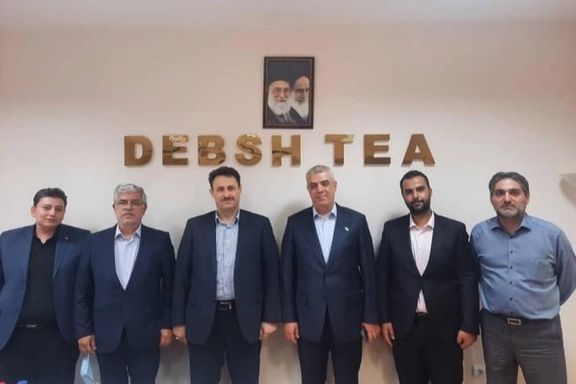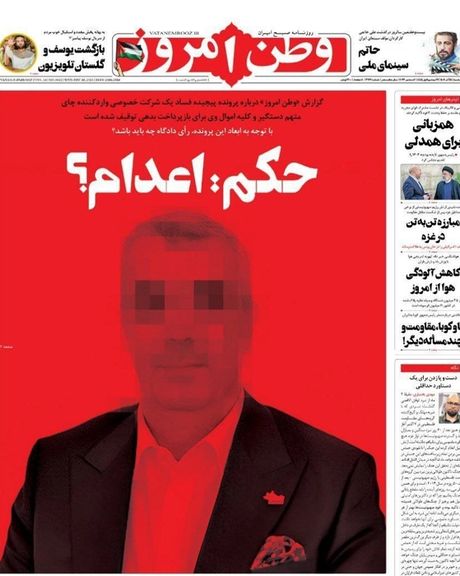Smell Of Iran’s Tea Graft Wafts Wide And Deep

Iranian media is still buzzing with the unfolding details of a colossal corruption case involving nearly $3.5 billion and key Islamic Republic figures.

Iranian media is still buzzing with the unfolding details of a colossal corruption case involving nearly $3.5 billion and key Islamic Republic figures.
The number of officials implicated in the case is so high that the blame game has become very complicated. Iran’s economy is plagued by corruption cases that seem systematic and often work like this: An official with a network of other regime insiders manages to secure foreign currency for international trade at discounted government rate and then sells it in the black market.
Whenever such cases are revealed, the authorities usually cope out of responsibility by blaming former administrations or officials from the opposing political camp. However, the $3.5 billion embezzlement case of Debsh Tea Company involves officials from both the current and the previous presidential administrations -- including ministers of agriculture, industry as well as the governors of the Central Bank of Iran and the chiefs of Iranian Customs Administration. It has also led to discord between the judiciary and the presidential administration as well as the parliament.
Apart from the accusations of corruption between reformist and conservative factions, the government and the judiciary also disagree on how to manage the scandal. President Ebrahim Raisi has called for this case not to become "political," a code in Iranian politics for burying an issue. Raisi called for the coverup after reports revealed his administration’s part in the case. Some reports say that until 2020 the annual budget allocated for importing tea was around $300 million, but the budget suddenly tripled in 2021 without any justification. Iran International has also learned that former Agriculture Minister Javad Sadatinejad, was removed by Raisi in mid-April in relation to the case.

Debsh company, handling most of the country's tea imports, received a staggering $3.37 billion in foreign currency from the government on a preferential exchange rate for tea and machinery imports from 2019 to 2022. However, it has allegedly sold $1.4 billion of the currency on the free market at a higher rate. The company also sold low-grade tea imported from Kenya as high-grade tea originating from India, with a $12 difference per kilogram. The company has been also involved in what has been described as fraud by re-importing cheaper Iranian tea and pocketing the difference in foreign currency.
Iran’s Chief Justice Gholam-Hossein Mohseni-Eje said Thursday that "The government has reported the dismissal of 60 individuals in this case, but these individuals have not been named." A few hours later, government spokesman Ali Bahadori Jahromi said that the dismissal of 60 managers in the past two years is not only over this particular case. Jahromi said earlier this week that several low and mid-ranking officials have been arrested over the case. The CEO of the company, Akbar Rahimi, is reportedly under arrest too. No reports about the details of these arrests and dismissals have been shared with the media and it is not even known if any court hearing was held.

Although top officials, including Supreme Leader Ali Khamenei, claim that corruption in the country is not systematic, the case of Debsh tea company could not have been allocated $3.5 billion while the total consumption of tea barely hits $300 million. According to former editor of conservative Kayhan daily, Mehdi Nasiri, such a large amount of corruption is not possible in Iran without the involvement of top officials and Khamenei's office.
The scandal has enraged Iranians who are suffering from a wide range of economic problems as well as shortages of medicines and some food items as the government has failed to lower inflation, currently above 50 percent.
Iran's top Sunni cleric Mowlavi Abdolhamid said during his Friday sermon that Islamic Republic officials acknowledge the extensive prevalence of corruption, which has reached a point where they are unable to curb or eradicate it. He stressed the necessity for fundamental changes to combat corruption, echoing the people's outcry that past policies have proven ineffective. The outspoken leader of Iran's Sunnis referring to the tea scandal said, "Corruption has become so widespread that some have dared to embezzle this amount for themselves."
Underlining that such a huge corruption case is not possible without the knowledge or coordination of senior officials, reformist Etemad newspaper says, “The main problem is that, aside from a general headline, no details have been released about the highest authorities involved.”